International Accounting Report: Financial Accounting Analysis
VerifiedAdded on 2022/12/29
|15
|5097
|60
Report
AI Summary
This report provides a comprehensive overview of international accounting, focusing on financial accounting and its related aspects. It delves into the analysis and evaluation of financial accounting, highlighting its significance for businesses and covering essential topics such as income statements, profit and loss accounts, and balance sheets. The report explores the objectives of financial reporting, the importance of financial information, and the roles of assets, liabilities, and equity. Furthermore, it discusses stewardship and its influence on financial reporting, emphasizing the importance of proper planning, management of resources, and accurate financial transaction recording. The report also touches upon the significance of standards, the need for flexibility in accounting methods, and the role of managers and standard setters, including the use of Generally Accepted Accounting Principles (GAAP).
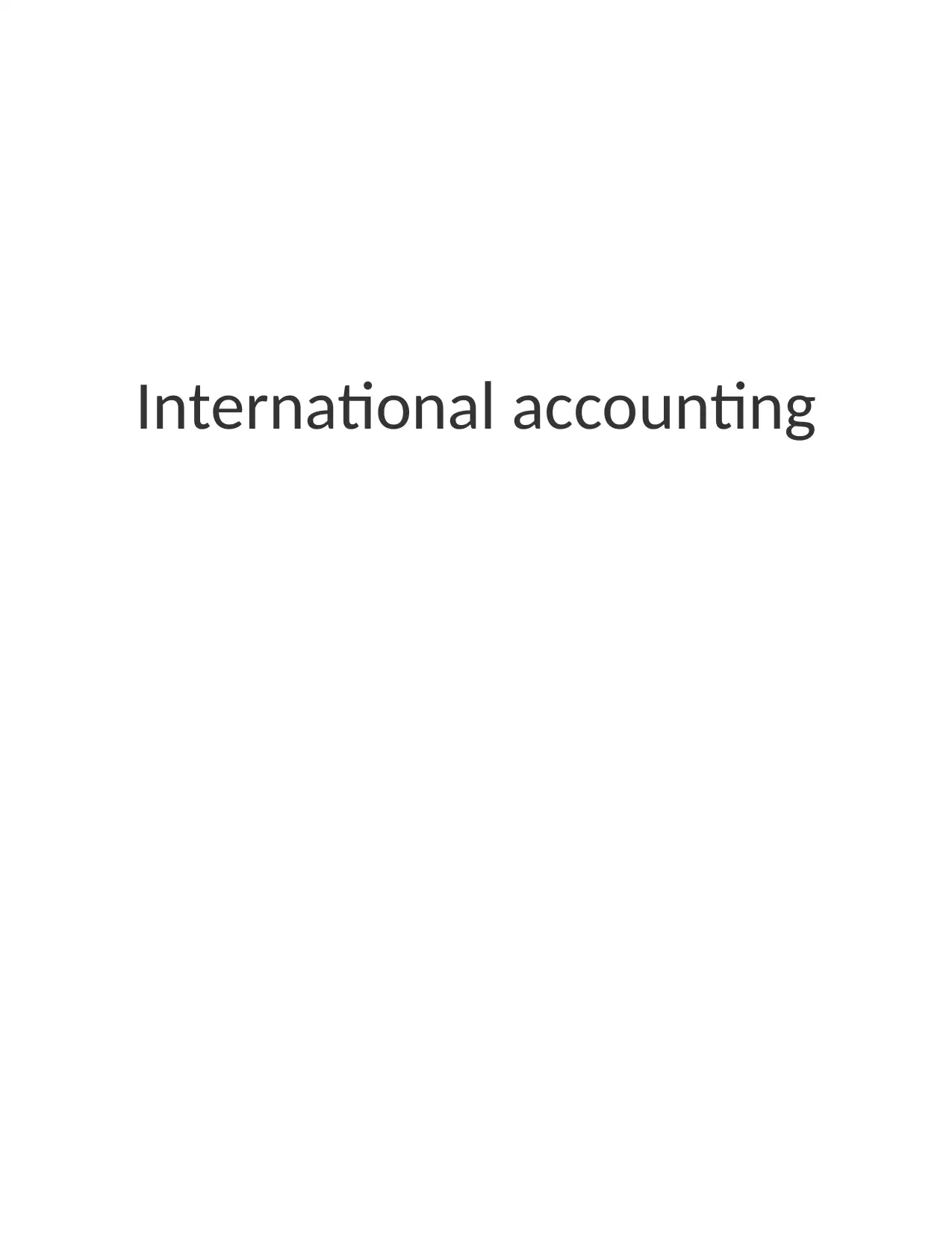
International accounting
Paraphrase This Document
Need a fresh take? Get an instant paraphrase of this document with our AI Paraphraser
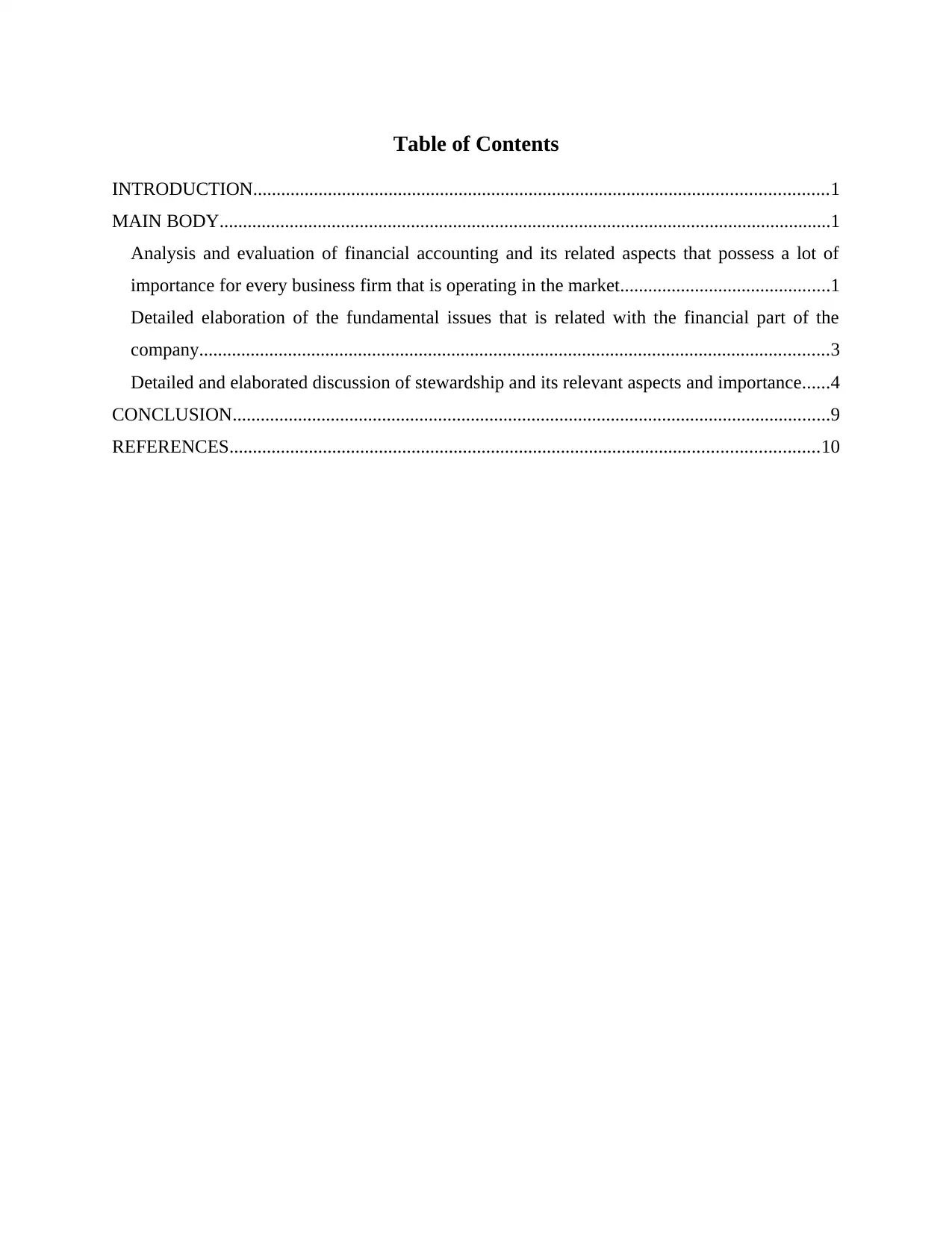
Table of Contents
INTRODUCTION...........................................................................................................................1
MAIN BODY...................................................................................................................................1
Analysis and evaluation of financial accounting and its related aspects that possess a lot of
importance for every business firm that is operating in the market.............................................1
Detailed elaboration of the fundamental issues that is related with the financial part of the
company.......................................................................................................................................3
Detailed and elaborated discussion of stewardship and its relevant aspects and importance......4
CONCLUSION................................................................................................................................9
REFERENCES..............................................................................................................................10
INTRODUCTION...........................................................................................................................1
MAIN BODY...................................................................................................................................1
Analysis and evaluation of financial accounting and its related aspects that possess a lot of
importance for every business firm that is operating in the market.............................................1
Detailed elaboration of the fundamental issues that is related with the financial part of the
company.......................................................................................................................................3
Detailed and elaborated discussion of stewardship and its relevant aspects and importance......4
CONCLUSION................................................................................................................................9
REFERENCES..............................................................................................................................10

⊘ This is a preview!⊘
Do you want full access?
Subscribe today to unlock all pages.

Trusted by 1+ million students worldwide
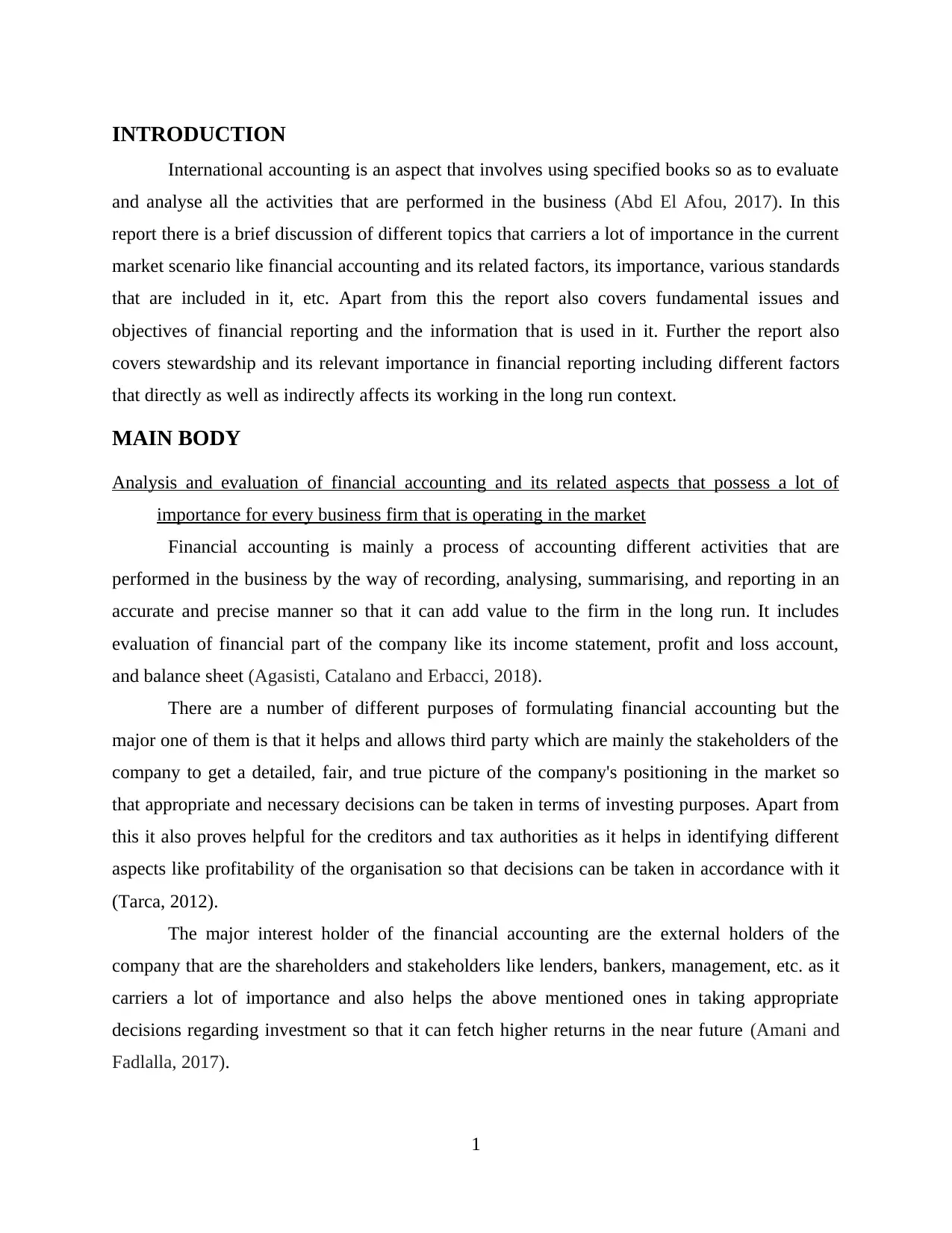
INTRODUCTION
International accounting is an aspect that involves using specified books so as to evaluate
and analyse all the activities that are performed in the business (Abd El Afou, 2017). In this
report there is a brief discussion of different topics that carriers a lot of importance in the current
market scenario like financial accounting and its related factors, its importance, various standards
that are included in it, etc. Apart from this the report also covers fundamental issues and
objectives of financial reporting and the information that is used in it. Further the report also
covers stewardship and its relevant importance in financial reporting including different factors
that directly as well as indirectly affects its working in the long run context.
MAIN BODY
Analysis and evaluation of financial accounting and its related aspects that possess a lot of
importance for every business firm that is operating in the market
Financial accounting is mainly a process of accounting different activities that are
performed in the business by the way of recording, analysing, summarising, and reporting in an
accurate and precise manner so that it can add value to the firm in the long run. It includes
evaluation of financial part of the company like its income statement, profit and loss account,
and balance sheet (Agasisti, Catalano and Erbacci, 2018).
There are a number of different purposes of formulating financial accounting but the
major one of them is that it helps and allows third party which are mainly the stakeholders of the
company to get a detailed, fair, and true picture of the company's positioning in the market so
that appropriate and necessary decisions can be taken in terms of investing purposes. Apart from
this it also proves helpful for the creditors and tax authorities as it helps in identifying different
aspects like profitability of the organisation so that decisions can be taken in accordance with it
(Tarca, 2012).
The major interest holder of the financial accounting are the external holders of the
company that are the shareholders and stakeholders like lenders, bankers, management, etc. as it
carriers a lot of importance and also helps the above mentioned ones in taking appropriate
decisions regarding investment so that it can fetch higher returns in the near future (Amani and
Fadlalla, 2017).
1
International accounting is an aspect that involves using specified books so as to evaluate
and analyse all the activities that are performed in the business (Abd El Afou, 2017). In this
report there is a brief discussion of different topics that carriers a lot of importance in the current
market scenario like financial accounting and its related factors, its importance, various standards
that are included in it, etc. Apart from this the report also covers fundamental issues and
objectives of financial reporting and the information that is used in it. Further the report also
covers stewardship and its relevant importance in financial reporting including different factors
that directly as well as indirectly affects its working in the long run context.
MAIN BODY
Analysis and evaluation of financial accounting and its related aspects that possess a lot of
importance for every business firm that is operating in the market
Financial accounting is mainly a process of accounting different activities that are
performed in the business by the way of recording, analysing, summarising, and reporting in an
accurate and precise manner so that it can add value to the firm in the long run. It includes
evaluation of financial part of the company like its income statement, profit and loss account,
and balance sheet (Agasisti, Catalano and Erbacci, 2018).
There are a number of different purposes of formulating financial accounting but the
major one of them is that it helps and allows third party which are mainly the stakeholders of the
company to get a detailed, fair, and true picture of the company's positioning in the market so
that appropriate and necessary decisions can be taken in terms of investing purposes. Apart from
this it also proves helpful for the creditors and tax authorities as it helps in identifying different
aspects like profitability of the organisation so that decisions can be taken in accordance with it
(Tarca, 2012).
The major interest holder of the financial accounting are the external holders of the
company that are the shareholders and stakeholders like lenders, bankers, management, etc. as it
carriers a lot of importance and also helps the above mentioned ones in taking appropriate
decisions regarding investment so that it can fetch higher returns in the near future (Amani and
Fadlalla, 2017).
1
Paraphrase This Document
Need a fresh take? Get an instant paraphrase of this document with our AI Paraphraser
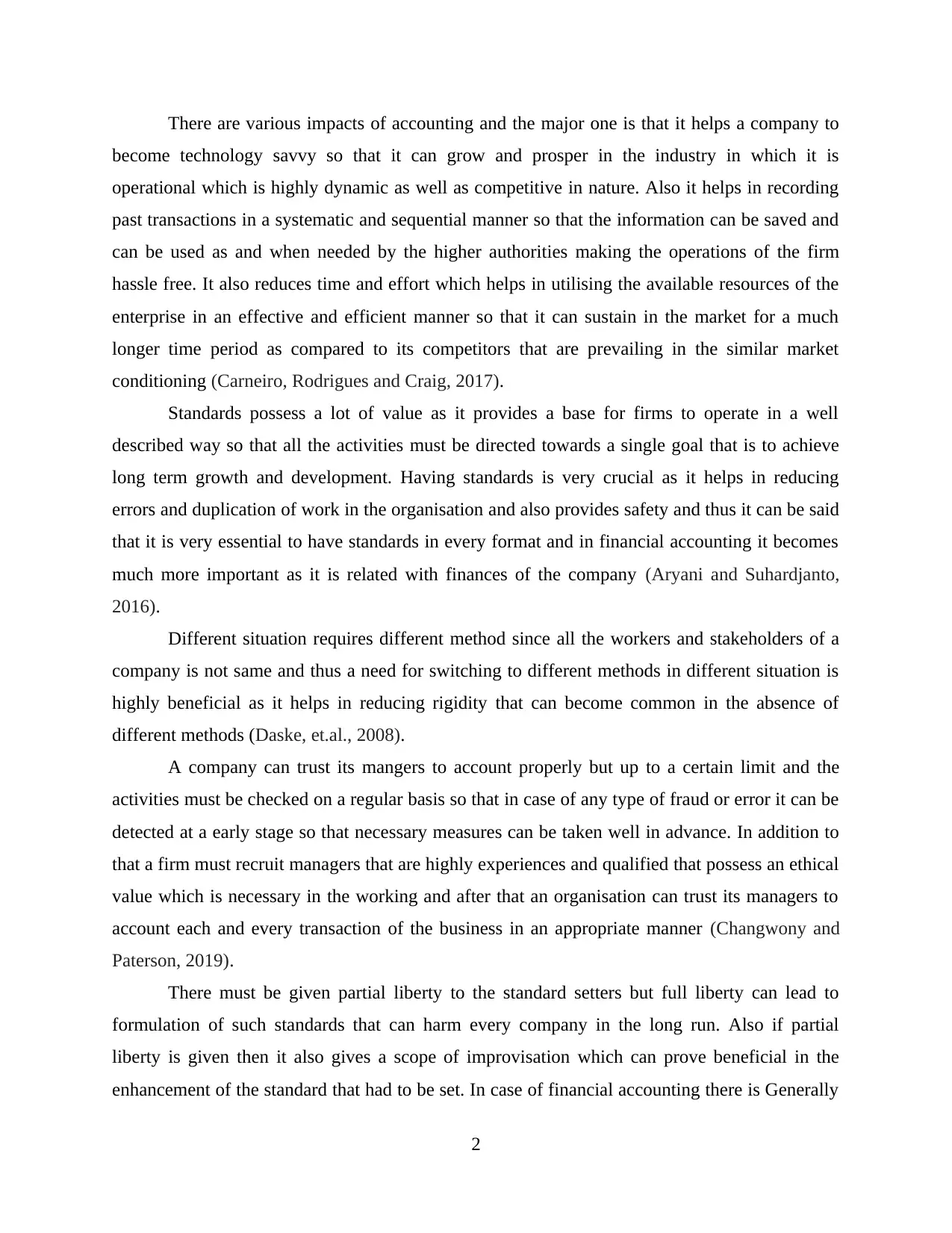
There are various impacts of accounting and the major one is that it helps a company to
become technology savvy so that it can grow and prosper in the industry in which it is
operational which is highly dynamic as well as competitive in nature. Also it helps in recording
past transactions in a systematic and sequential manner so that the information can be saved and
can be used as and when needed by the higher authorities making the operations of the firm
hassle free. It also reduces time and effort which helps in utilising the available resources of the
enterprise in an effective and efficient manner so that it can sustain in the market for a much
longer time period as compared to its competitors that are prevailing in the similar market
conditioning (Carneiro, Rodrigues and Craig, 2017).
Standards possess a lot of value as it provides a base for firms to operate in a well
described way so that all the activities must be directed towards a single goal that is to achieve
long term growth and development. Having standards is very crucial as it helps in reducing
errors and duplication of work in the organisation and also provides safety and thus it can be said
that it is very essential to have standards in every format and in financial accounting it becomes
much more important as it is related with finances of the company (Aryani and Suhardjanto,
2016).
Different situation requires different method since all the workers and stakeholders of a
company is not same and thus a need for switching to different methods in different situation is
highly beneficial as it helps in reducing rigidity that can become common in the absence of
different methods (Daske, et.al., 2008).
A company can trust its mangers to account properly but up to a certain limit and the
activities must be checked on a regular basis so that in case of any type of fraud or error it can be
detected at a early stage so that necessary measures can be taken well in advance. In addition to
that a firm must recruit managers that are highly experiences and qualified that possess an ethical
value which is necessary in the working and after that an organisation can trust its managers to
account each and every transaction of the business in an appropriate manner (Changwony and
Paterson, 2019).
There must be given partial liberty to the standard setters but full liberty can lead to
formulation of such standards that can harm every company in the long run. Also if partial
liberty is given then it also gives a scope of improvisation which can prove beneficial in the
enhancement of the standard that had to be set. In case of financial accounting there is Generally
2
become technology savvy so that it can grow and prosper in the industry in which it is
operational which is highly dynamic as well as competitive in nature. Also it helps in recording
past transactions in a systematic and sequential manner so that the information can be saved and
can be used as and when needed by the higher authorities making the operations of the firm
hassle free. It also reduces time and effort which helps in utilising the available resources of the
enterprise in an effective and efficient manner so that it can sustain in the market for a much
longer time period as compared to its competitors that are prevailing in the similar market
conditioning (Carneiro, Rodrigues and Craig, 2017).
Standards possess a lot of value as it provides a base for firms to operate in a well
described way so that all the activities must be directed towards a single goal that is to achieve
long term growth and development. Having standards is very crucial as it helps in reducing
errors and duplication of work in the organisation and also provides safety and thus it can be said
that it is very essential to have standards in every format and in financial accounting it becomes
much more important as it is related with finances of the company (Aryani and Suhardjanto,
2016).
Different situation requires different method since all the workers and stakeholders of a
company is not same and thus a need for switching to different methods in different situation is
highly beneficial as it helps in reducing rigidity that can become common in the absence of
different methods (Daske, et.al., 2008).
A company can trust its mangers to account properly but up to a certain limit and the
activities must be checked on a regular basis so that in case of any type of fraud or error it can be
detected at a early stage so that necessary measures can be taken well in advance. In addition to
that a firm must recruit managers that are highly experiences and qualified that possess an ethical
value which is necessary in the working and after that an organisation can trust its managers to
account each and every transaction of the business in an appropriate manner (Changwony and
Paterson, 2019).
There must be given partial liberty to the standard setters but full liberty can lead to
formulation of such standards that can harm every company in the long run. Also if partial
liberty is given then it also gives a scope of improvisation which can prove beneficial in the
enhancement of the standard that had to be set. In case of financial accounting there is Generally
2
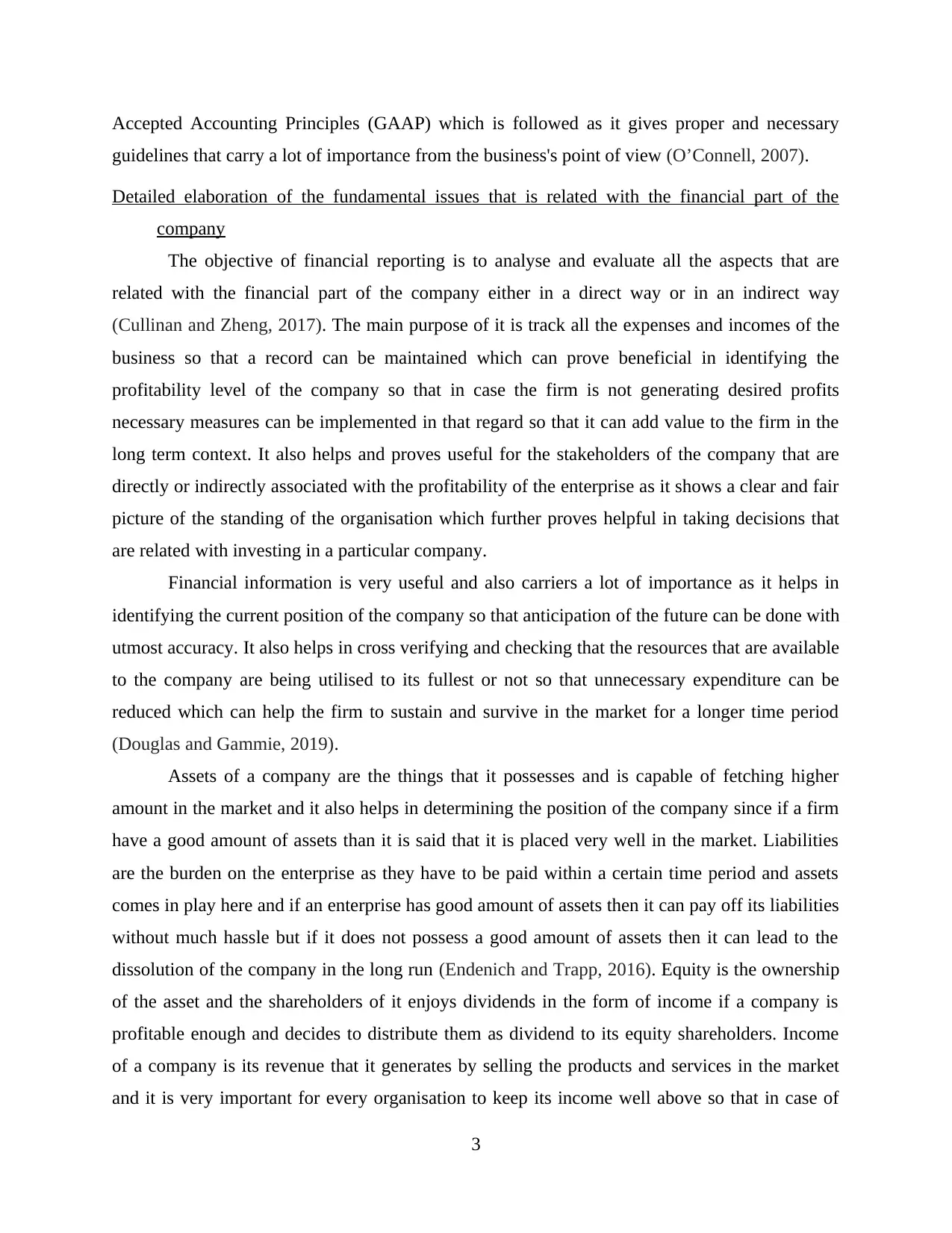
Accepted Accounting Principles (GAAP) which is followed as it gives proper and necessary
guidelines that carry a lot of importance from the business's point of view (O’Connell, 2007).
Detailed elaboration of the fundamental issues that is related with the financial part of the
company
The objective of financial reporting is to analyse and evaluate all the aspects that are
related with the financial part of the company either in a direct way or in an indirect way
(Cullinan and Zheng, 2017). The main purpose of it is track all the expenses and incomes of the
business so that a record can be maintained which can prove beneficial in identifying the
profitability level of the company so that in case the firm is not generating desired profits
necessary measures can be implemented in that regard so that it can add value to the firm in the
long term context. It also helps and proves useful for the stakeholders of the company that are
directly or indirectly associated with the profitability of the enterprise as it shows a clear and fair
picture of the standing of the organisation which further proves helpful in taking decisions that
are related with investing in a particular company.
Financial information is very useful and also carriers a lot of importance as it helps in
identifying the current position of the company so that anticipation of the future can be done with
utmost accuracy. It also helps in cross verifying and checking that the resources that are available
to the company are being utilised to its fullest or not so that unnecessary expenditure can be
reduced which can help the firm to sustain and survive in the market for a longer time period
(Douglas and Gammie, 2019).
Assets of a company are the things that it possesses and is capable of fetching higher
amount in the market and it also helps in determining the position of the company since if a firm
have a good amount of assets than it is said that it is placed very well in the market. Liabilities
are the burden on the enterprise as they have to be paid within a certain time period and assets
comes in play here and if an enterprise has good amount of assets then it can pay off its liabilities
without much hassle but if it does not possess a good amount of assets then it can lead to the
dissolution of the company in the long run (Endenich and Trapp, 2016). Equity is the ownership
of the asset and the shareholders of it enjoys dividends in the form of income if a company is
profitable enough and decides to distribute them as dividend to its equity shareholders. Income
of a company is its revenue that it generates by selling the products and services in the market
and it is very important for every organisation to keep its income well above so that in case of
3
guidelines that carry a lot of importance from the business's point of view (O’Connell, 2007).
Detailed elaboration of the fundamental issues that is related with the financial part of the
company
The objective of financial reporting is to analyse and evaluate all the aspects that are
related with the financial part of the company either in a direct way or in an indirect way
(Cullinan and Zheng, 2017). The main purpose of it is track all the expenses and incomes of the
business so that a record can be maintained which can prove beneficial in identifying the
profitability level of the company so that in case the firm is not generating desired profits
necessary measures can be implemented in that regard so that it can add value to the firm in the
long term context. It also helps and proves useful for the stakeholders of the company that are
directly or indirectly associated with the profitability of the enterprise as it shows a clear and fair
picture of the standing of the organisation which further proves helpful in taking decisions that
are related with investing in a particular company.
Financial information is very useful and also carriers a lot of importance as it helps in
identifying the current position of the company so that anticipation of the future can be done with
utmost accuracy. It also helps in cross verifying and checking that the resources that are available
to the company are being utilised to its fullest or not so that unnecessary expenditure can be
reduced which can help the firm to sustain and survive in the market for a longer time period
(Douglas and Gammie, 2019).
Assets of a company are the things that it possesses and is capable of fetching higher
amount in the market and it also helps in determining the position of the company since if a firm
have a good amount of assets than it is said that it is placed very well in the market. Liabilities
are the burden on the enterprise as they have to be paid within a certain time period and assets
comes in play here and if an enterprise has good amount of assets then it can pay off its liabilities
without much hassle but if it does not possess a good amount of assets then it can lead to the
dissolution of the company in the long run (Endenich and Trapp, 2016). Equity is the ownership
of the asset and the shareholders of it enjoys dividends in the form of income if a company is
profitable enough and decides to distribute them as dividend to its equity shareholders. Income
of a company is its revenue that it generates by selling the products and services in the market
and it is very important for every organisation to keep its income well above so that in case of
3
⊘ This is a preview!⊘
Do you want full access?
Subscribe today to unlock all pages.

Trusted by 1+ million students worldwide
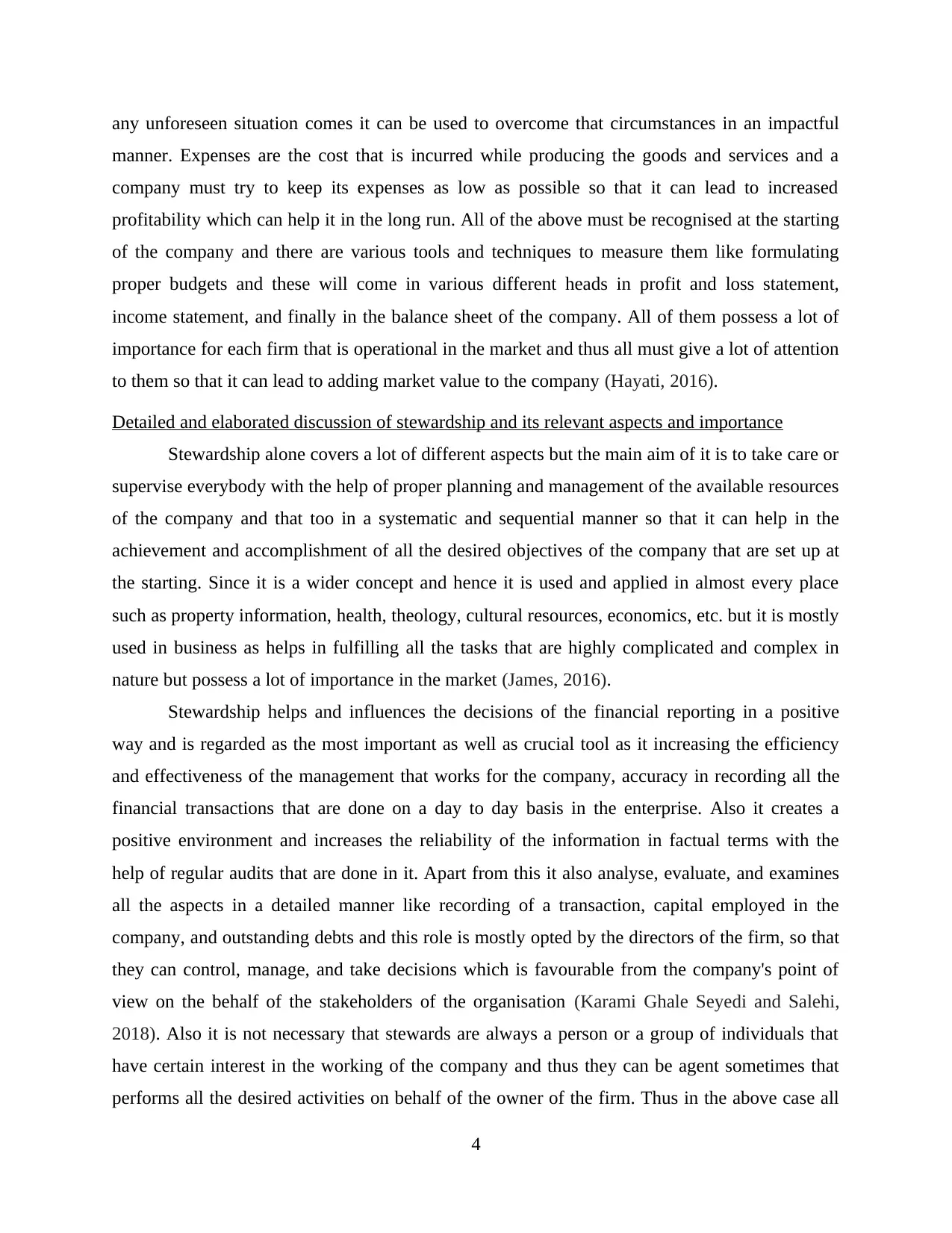
any unforeseen situation comes it can be used to overcome that circumstances in an impactful
manner. Expenses are the cost that is incurred while producing the goods and services and a
company must try to keep its expenses as low as possible so that it can lead to increased
profitability which can help it in the long run. All of the above must be recognised at the starting
of the company and there are various tools and techniques to measure them like formulating
proper budgets and these will come in various different heads in profit and loss statement,
income statement, and finally in the balance sheet of the company. All of them possess a lot of
importance for each firm that is operational in the market and thus all must give a lot of attention
to them so that it can lead to adding market value to the company (Hayati, 2016).
Detailed and elaborated discussion of stewardship and its relevant aspects and importance
Stewardship alone covers a lot of different aspects but the main aim of it is to take care or
supervise everybody with the help of proper planning and management of the available resources
of the company and that too in a systematic and sequential manner so that it can help in the
achievement and accomplishment of all the desired objectives of the company that are set up at
the starting. Since it is a wider concept and hence it is used and applied in almost every place
such as property information, health, theology, cultural resources, economics, etc. but it is mostly
used in business as helps in fulfilling all the tasks that are highly complicated and complex in
nature but possess a lot of importance in the market (James, 2016).
Stewardship helps and influences the decisions of the financial reporting in a positive
way and is regarded as the most important as well as crucial tool as it increasing the efficiency
and effectiveness of the management that works for the company, accuracy in recording all the
financial transactions that are done on a day to day basis in the enterprise. Also it creates a
positive environment and increases the reliability of the information in factual terms with the
help of regular audits that are done in it. Apart from this it also analyse, evaluate, and examines
all the aspects in a detailed manner like recording of a transaction, capital employed in the
company, and outstanding debts and this role is mostly opted by the directors of the firm, so that
they can control, manage, and take decisions which is favourable from the company's point of
view on the behalf of the stakeholders of the organisation (Karami Ghale Seyedi and Salehi,
2018). Also it is not necessary that stewards are always a person or a group of individuals that
have certain interest in the working of the company and thus they can be agent sometimes that
performs all the desired activities on behalf of the owner of the firm. Thus in the above case all
4
manner. Expenses are the cost that is incurred while producing the goods and services and a
company must try to keep its expenses as low as possible so that it can lead to increased
profitability which can help it in the long run. All of the above must be recognised at the starting
of the company and there are various tools and techniques to measure them like formulating
proper budgets and these will come in various different heads in profit and loss statement,
income statement, and finally in the balance sheet of the company. All of them possess a lot of
importance for each firm that is operational in the market and thus all must give a lot of attention
to them so that it can lead to adding market value to the company (Hayati, 2016).
Detailed and elaborated discussion of stewardship and its relevant aspects and importance
Stewardship alone covers a lot of different aspects but the main aim of it is to take care or
supervise everybody with the help of proper planning and management of the available resources
of the company and that too in a systematic and sequential manner so that it can help in the
achievement and accomplishment of all the desired objectives of the company that are set up at
the starting. Since it is a wider concept and hence it is used and applied in almost every place
such as property information, health, theology, cultural resources, economics, etc. but it is mostly
used in business as helps in fulfilling all the tasks that are highly complicated and complex in
nature but possess a lot of importance in the market (James, 2016).
Stewardship helps and influences the decisions of the financial reporting in a positive
way and is regarded as the most important as well as crucial tool as it increasing the efficiency
and effectiveness of the management that works for the company, accuracy in recording all the
financial transactions that are done on a day to day basis in the enterprise. Also it creates a
positive environment and increases the reliability of the information in factual terms with the
help of regular audits that are done in it. Apart from this it also analyse, evaluate, and examines
all the aspects in a detailed manner like recording of a transaction, capital employed in the
company, and outstanding debts and this role is mostly opted by the directors of the firm, so that
they can control, manage, and take decisions which is favourable from the company's point of
view on the behalf of the stakeholders of the organisation (Karami Ghale Seyedi and Salehi,
2018). Also it is not necessary that stewards are always a person or a group of individuals that
have certain interest in the working of the company and thus they can be agent sometimes that
performs all the desired activities on behalf of the owner of the firm. Thus in the above case all
4
Paraphrase This Document
Need a fresh take? Get an instant paraphrase of this document with our AI Paraphraser
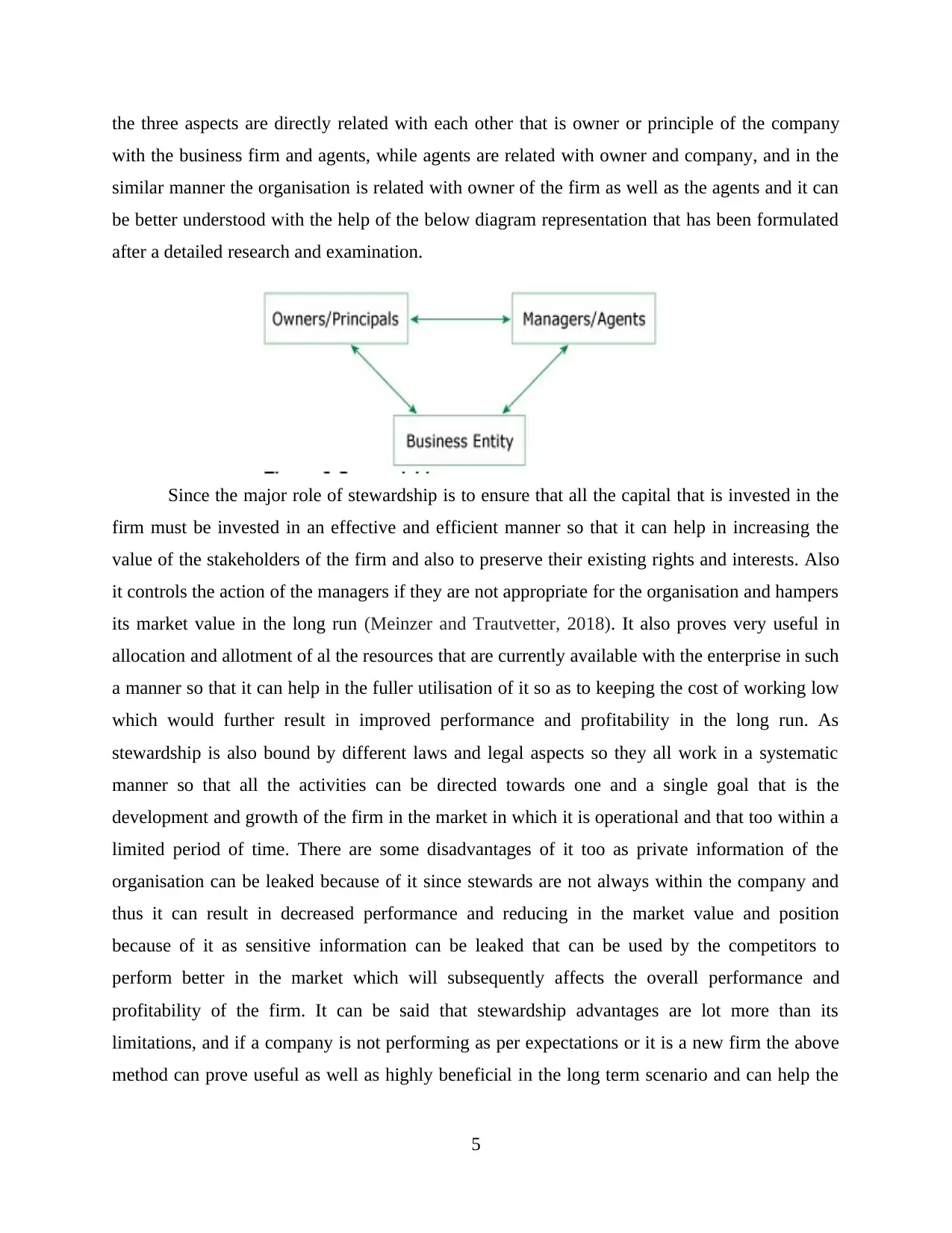
the three aspects are directly related with each other that is owner or principle of the company
with the business firm and agents, while agents are related with owner and company, and in the
similar manner the organisation is related with owner of the firm as well as the agents and it can
be better understood with the help of the below diagram representation that has been formulated
after a detailed research and examination.
Since the major role of stewardship is to ensure that all the capital that is invested in the
firm must be invested in an effective and efficient manner so that it can help in increasing the
value of the stakeholders of the firm and also to preserve their existing rights and interests. Also
it controls the action of the managers if they are not appropriate for the organisation and hampers
its market value in the long run (Meinzer and Trautvetter, 2018). It also proves very useful in
allocation and allotment of al the resources that are currently available with the enterprise in such
a manner so that it can help in the fuller utilisation of it so as to keeping the cost of working low
which would further result in improved performance and profitability in the long run. As
stewardship is also bound by different laws and legal aspects so they all work in a systematic
manner so that all the activities can be directed towards one and a single goal that is the
development and growth of the firm in the market in which it is operational and that too within a
limited period of time. There are some disadvantages of it too as private information of the
organisation can be leaked because of it since stewards are not always within the company and
thus it can result in decreased performance and reducing in the market value and position
because of it as sensitive information can be leaked that can be used by the competitors to
perform better in the market which will subsequently affects the overall performance and
profitability of the firm. It can be said that stewardship advantages are lot more than its
limitations, and if a company is not performing as per expectations or it is a new firm the above
method can prove useful as well as highly beneficial in the long term scenario and can help the
5
with the business firm and agents, while agents are related with owner and company, and in the
similar manner the organisation is related with owner of the firm as well as the agents and it can
be better understood with the help of the below diagram representation that has been formulated
after a detailed research and examination.
Since the major role of stewardship is to ensure that all the capital that is invested in the
firm must be invested in an effective and efficient manner so that it can help in increasing the
value of the stakeholders of the firm and also to preserve their existing rights and interests. Also
it controls the action of the managers if they are not appropriate for the organisation and hampers
its market value in the long run (Meinzer and Trautvetter, 2018). It also proves very useful in
allocation and allotment of al the resources that are currently available with the enterprise in such
a manner so that it can help in the fuller utilisation of it so as to keeping the cost of working low
which would further result in improved performance and profitability in the long run. As
stewardship is also bound by different laws and legal aspects so they all work in a systematic
manner so that all the activities can be directed towards one and a single goal that is the
development and growth of the firm in the market in which it is operational and that too within a
limited period of time. There are some disadvantages of it too as private information of the
organisation can be leaked because of it since stewards are not always within the company and
thus it can result in decreased performance and reducing in the market value and position
because of it as sensitive information can be leaked that can be used by the competitors to
perform better in the market which will subsequently affects the overall performance and
profitability of the firm. It can be said that stewardship advantages are lot more than its
limitations, and if a company is not performing as per expectations or it is a new firm the above
method can prove useful as well as highly beneficial in the long term scenario and can help the
5
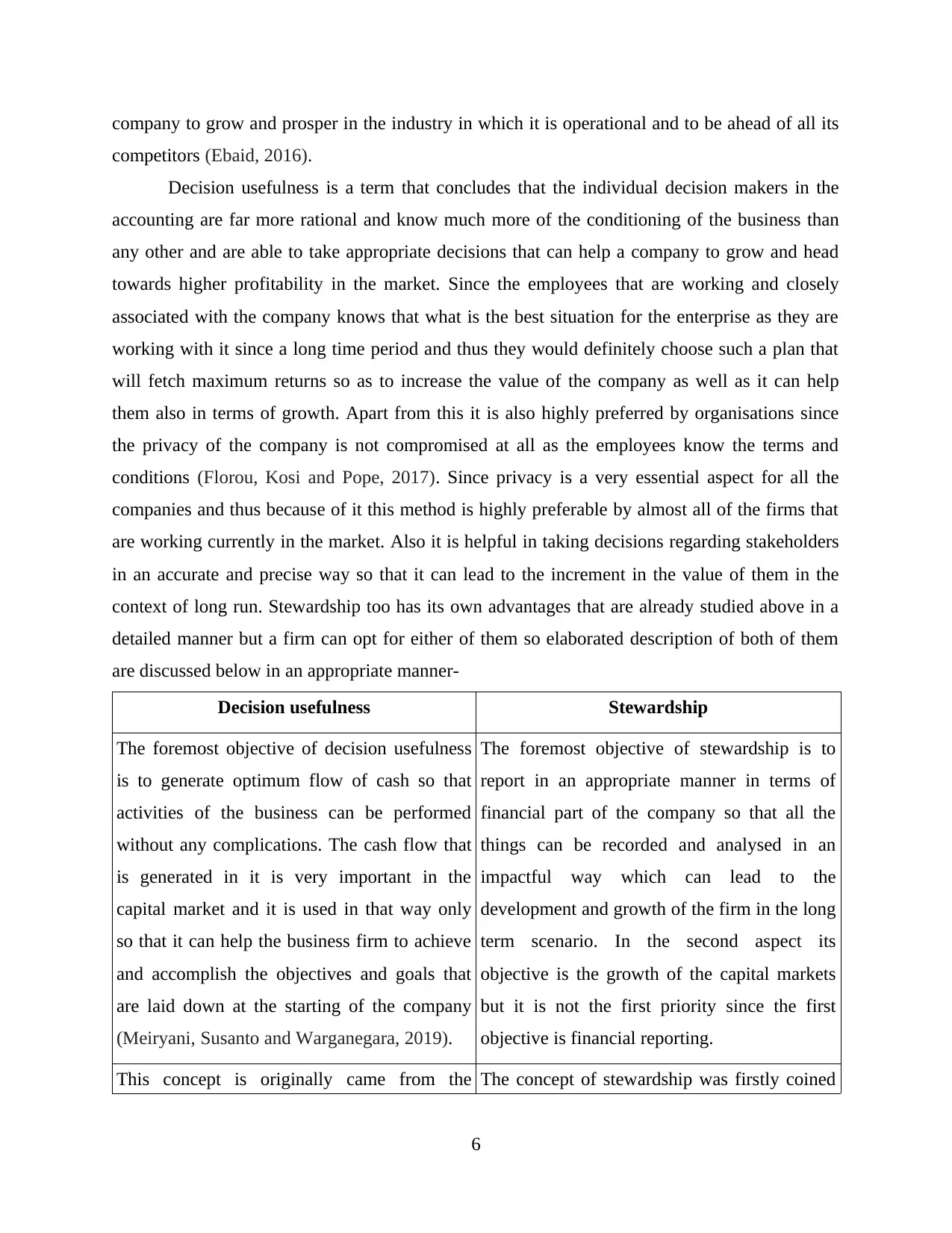
company to grow and prosper in the industry in which it is operational and to be ahead of all its
competitors (Ebaid, 2016).
Decision usefulness is a term that concludes that the individual decision makers in the
accounting are far more rational and know much more of the conditioning of the business than
any other and are able to take appropriate decisions that can help a company to grow and head
towards higher profitability in the market. Since the employees that are working and closely
associated with the company knows that what is the best situation for the enterprise as they are
working with it since a long time period and thus they would definitely choose such a plan that
will fetch maximum returns so as to increase the value of the company as well as it can help
them also in terms of growth. Apart from this it is also highly preferred by organisations since
the privacy of the company is not compromised at all as the employees know the terms and
conditions (Florou, Kosi and Pope, 2017). Since privacy is a very essential aspect for all the
companies and thus because of it this method is highly preferable by almost all of the firms that
are working currently in the market. Also it is helpful in taking decisions regarding stakeholders
in an accurate and precise way so that it can lead to the increment in the value of them in the
context of long run. Stewardship too has its own advantages that are already studied above in a
detailed manner but a firm can opt for either of them so elaborated description of both of them
are discussed below in an appropriate manner-
Decision usefulness Stewardship
The foremost objective of decision usefulness
is to generate optimum flow of cash so that
activities of the business can be performed
without any complications. The cash flow that
is generated in it is very important in the
capital market and it is used in that way only
so that it can help the business firm to achieve
and accomplish the objectives and goals that
are laid down at the starting of the company
(Meiryani, Susanto and Warganegara, 2019).
The foremost objective of stewardship is to
report in an appropriate manner in terms of
financial part of the company so that all the
things can be recorded and analysed in an
impactful way which can lead to the
development and growth of the firm in the long
term scenario. In the second aspect its
objective is the growth of the capital markets
but it is not the first priority since the first
objective is financial reporting.
This concept is originally came from the The concept of stewardship was firstly coined
6
competitors (Ebaid, 2016).
Decision usefulness is a term that concludes that the individual decision makers in the
accounting are far more rational and know much more of the conditioning of the business than
any other and are able to take appropriate decisions that can help a company to grow and head
towards higher profitability in the market. Since the employees that are working and closely
associated with the company knows that what is the best situation for the enterprise as they are
working with it since a long time period and thus they would definitely choose such a plan that
will fetch maximum returns so as to increase the value of the company as well as it can help
them also in terms of growth. Apart from this it is also highly preferred by organisations since
the privacy of the company is not compromised at all as the employees know the terms and
conditions (Florou, Kosi and Pope, 2017). Since privacy is a very essential aspect for all the
companies and thus because of it this method is highly preferable by almost all of the firms that
are working currently in the market. Also it is helpful in taking decisions regarding stakeholders
in an accurate and precise way so that it can lead to the increment in the value of them in the
context of long run. Stewardship too has its own advantages that are already studied above in a
detailed manner but a firm can opt for either of them so elaborated description of both of them
are discussed below in an appropriate manner-
Decision usefulness Stewardship
The foremost objective of decision usefulness
is to generate optimum flow of cash so that
activities of the business can be performed
without any complications. The cash flow that
is generated in it is very important in the
capital market and it is used in that way only
so that it can help the business firm to achieve
and accomplish the objectives and goals that
are laid down at the starting of the company
(Meiryani, Susanto and Warganegara, 2019).
The foremost objective of stewardship is to
report in an appropriate manner in terms of
financial part of the company so that all the
things can be recorded and analysed in an
impactful way which can lead to the
development and growth of the firm in the long
term scenario. In the second aspect its
objective is the growth of the capital markets
but it is not the first priority since the first
objective is financial reporting.
This concept is originally came from the The concept of stewardship was firstly coined
6
⊘ This is a preview!⊘
Do you want full access?
Subscribe today to unlock all pages.

Trusted by 1+ million students worldwide
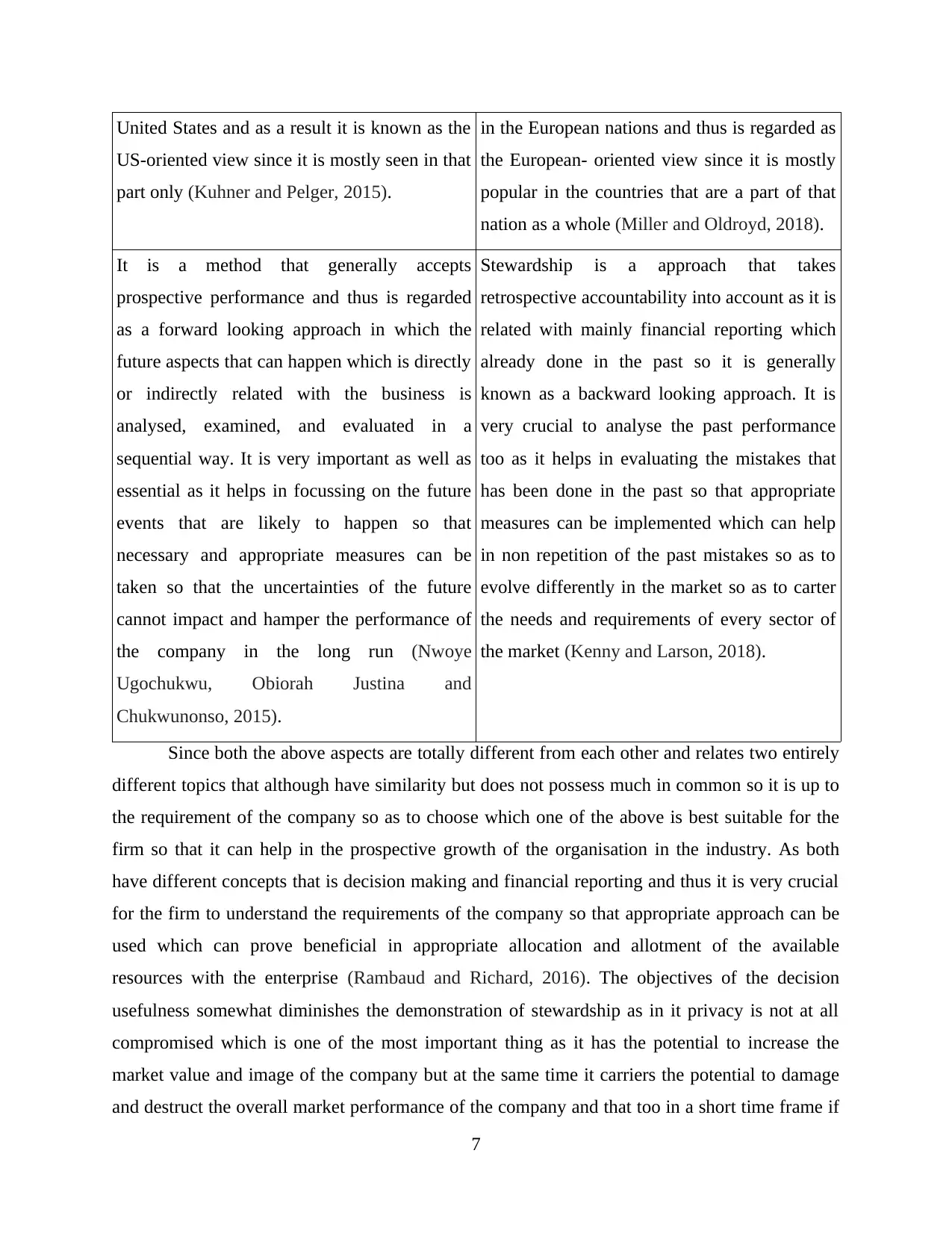
United States and as a result it is known as the
US-oriented view since it is mostly seen in that
part only (Kuhner and Pelger, 2015).
in the European nations and thus is regarded as
the European- oriented view since it is mostly
popular in the countries that are a part of that
nation as a whole (Miller and Oldroyd, 2018).
It is a method that generally accepts
prospective performance and thus is regarded
as a forward looking approach in which the
future aspects that can happen which is directly
or indirectly related with the business is
analysed, examined, and evaluated in a
sequential way. It is very important as well as
essential as it helps in focussing on the future
events that are likely to happen so that
necessary and appropriate measures can be
taken so that the uncertainties of the future
cannot impact and hamper the performance of
the company in the long run (Nwoye
Ugochukwu, Obiorah Justina and
Chukwunonso, 2015).
Stewardship is a approach that takes
retrospective accountability into account as it is
related with mainly financial reporting which
already done in the past so it is generally
known as a backward looking approach. It is
very crucial to analyse the past performance
too as it helps in evaluating the mistakes that
has been done in the past so that appropriate
measures can be implemented which can help
in non repetition of the past mistakes so as to
evolve differently in the market so as to carter
the needs and requirements of every sector of
the market (Kenny and Larson, 2018).
Since both the above aspects are totally different from each other and relates two entirely
different topics that although have similarity but does not possess much in common so it is up to
the requirement of the company so as to choose which one of the above is best suitable for the
firm so that it can help in the prospective growth of the organisation in the industry. As both
have different concepts that is decision making and financial reporting and thus it is very crucial
for the firm to understand the requirements of the company so that appropriate approach can be
used which can prove beneficial in appropriate allocation and allotment of the available
resources with the enterprise (Rambaud and Richard, 2016). The objectives of the decision
usefulness somewhat diminishes the demonstration of stewardship as in it privacy is not at all
compromised which is one of the most important thing as it has the potential to increase the
market value and image of the company but at the same time it carriers the potential to damage
and destruct the overall market performance of the company and that too in a short time frame if
7
US-oriented view since it is mostly seen in that
part only (Kuhner and Pelger, 2015).
in the European nations and thus is regarded as
the European- oriented view since it is mostly
popular in the countries that are a part of that
nation as a whole (Miller and Oldroyd, 2018).
It is a method that generally accepts
prospective performance and thus is regarded
as a forward looking approach in which the
future aspects that can happen which is directly
or indirectly related with the business is
analysed, examined, and evaluated in a
sequential way. It is very important as well as
essential as it helps in focussing on the future
events that are likely to happen so that
necessary and appropriate measures can be
taken so that the uncertainties of the future
cannot impact and hamper the performance of
the company in the long run (Nwoye
Ugochukwu, Obiorah Justina and
Chukwunonso, 2015).
Stewardship is a approach that takes
retrospective accountability into account as it is
related with mainly financial reporting which
already done in the past so it is generally
known as a backward looking approach. It is
very crucial to analyse the past performance
too as it helps in evaluating the mistakes that
has been done in the past so that appropriate
measures can be implemented which can help
in non repetition of the past mistakes so as to
evolve differently in the market so as to carter
the needs and requirements of every sector of
the market (Kenny and Larson, 2018).
Since both the above aspects are totally different from each other and relates two entirely
different topics that although have similarity but does not possess much in common so it is up to
the requirement of the company so as to choose which one of the above is best suitable for the
firm so that it can help in the prospective growth of the organisation in the industry. As both
have different concepts that is decision making and financial reporting and thus it is very crucial
for the firm to understand the requirements of the company so that appropriate approach can be
used which can prove beneficial in appropriate allocation and allotment of the available
resources with the enterprise (Rambaud and Richard, 2016). The objectives of the decision
usefulness somewhat diminishes the demonstration of stewardship as in it privacy is not at all
compromised which is one of the most important thing as it has the potential to increase the
market value and image of the company but at the same time it carriers the potential to damage
and destruct the overall market performance of the company and that too in a short time frame if
7
Paraphrase This Document
Need a fresh take? Get an instant paraphrase of this document with our AI Paraphraser
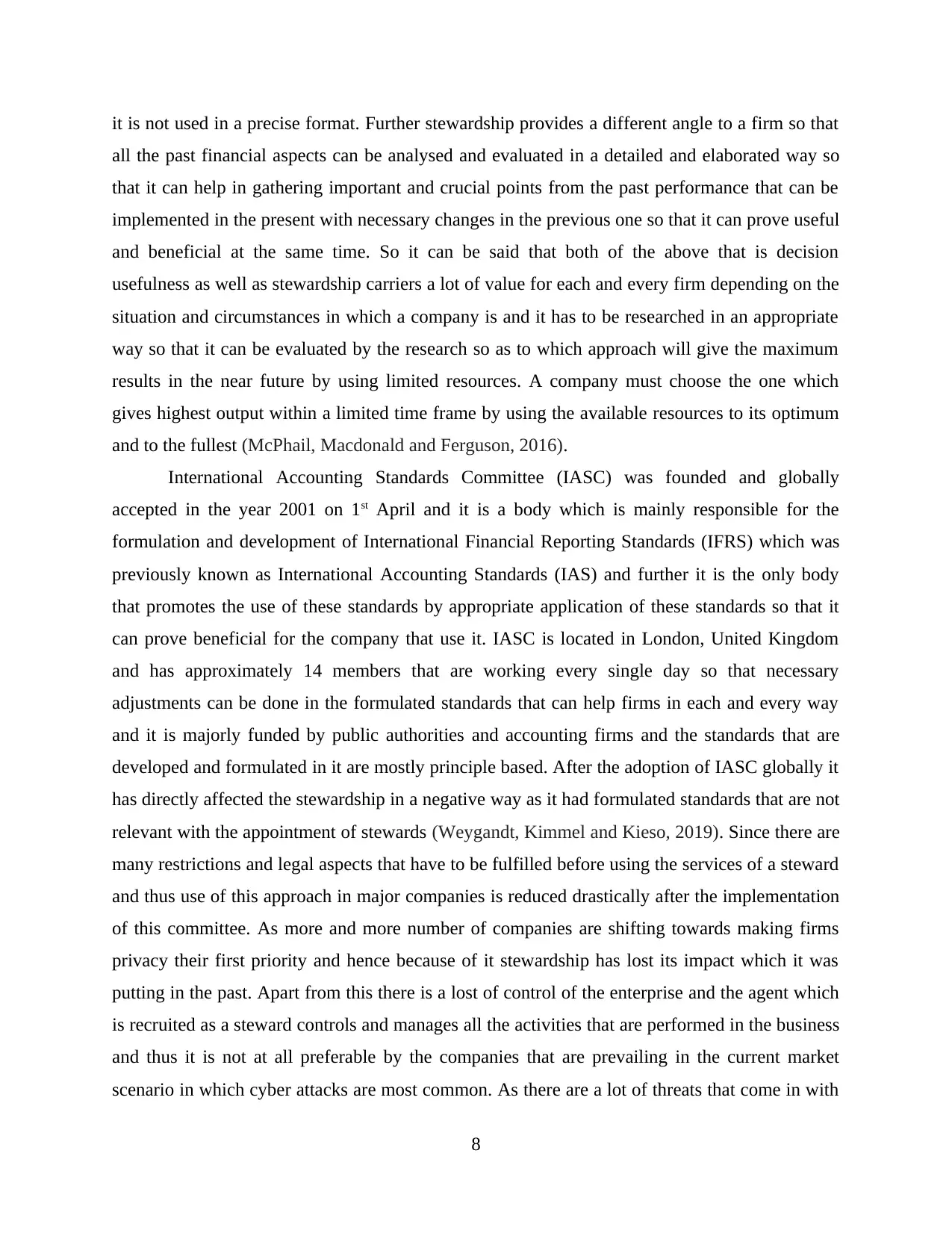
it is not used in a precise format. Further stewardship provides a different angle to a firm so that
all the past financial aspects can be analysed and evaluated in a detailed and elaborated way so
that it can help in gathering important and crucial points from the past performance that can be
implemented in the present with necessary changes in the previous one so that it can prove useful
and beneficial at the same time. So it can be said that both of the above that is decision
usefulness as well as stewardship carriers a lot of value for each and every firm depending on the
situation and circumstances in which a company is and it has to be researched in an appropriate
way so that it can be evaluated by the research so as to which approach will give the maximum
results in the near future by using limited resources. A company must choose the one which
gives highest output within a limited time frame by using the available resources to its optimum
and to the fullest (McPhail, Macdonald and Ferguson, 2016).
International Accounting Standards Committee (IASC) was founded and globally
accepted in the year 2001 on 1st April and it is a body which is mainly responsible for the
formulation and development of International Financial Reporting Standards (IFRS) which was
previously known as International Accounting Standards (IAS) and further it is the only body
that promotes the use of these standards by appropriate application of these standards so that it
can prove beneficial for the company that use it. IASC is located in London, United Kingdom
and has approximately 14 members that are working every single day so that necessary
adjustments can be done in the formulated standards that can help firms in each and every way
and it is majorly funded by public authorities and accounting firms and the standards that are
developed and formulated in it are mostly principle based. After the adoption of IASC globally it
has directly affected the stewardship in a negative way as it had formulated standards that are not
relevant with the appointment of stewards (Weygandt, Kimmel and Kieso, 2019). Since there are
many restrictions and legal aspects that have to be fulfilled before using the services of a steward
and thus use of this approach in major companies is reduced drastically after the implementation
of this committee. As more and more number of companies are shifting towards making firms
privacy their first priority and hence because of it stewardship has lost its impact which it was
putting in the past. Apart from this there is a lost of control of the enterprise and the agent which
is recruited as a steward controls and manages all the activities that are performed in the business
and thus it is not at all preferable by the companies that are prevailing in the current market
scenario in which cyber attacks are most common. As there are a lot of threats that come in with
8
all the past financial aspects can be analysed and evaluated in a detailed and elaborated way so
that it can help in gathering important and crucial points from the past performance that can be
implemented in the present with necessary changes in the previous one so that it can prove useful
and beneficial at the same time. So it can be said that both of the above that is decision
usefulness as well as stewardship carriers a lot of value for each and every firm depending on the
situation and circumstances in which a company is and it has to be researched in an appropriate
way so that it can be evaluated by the research so as to which approach will give the maximum
results in the near future by using limited resources. A company must choose the one which
gives highest output within a limited time frame by using the available resources to its optimum
and to the fullest (McPhail, Macdonald and Ferguson, 2016).
International Accounting Standards Committee (IASC) was founded and globally
accepted in the year 2001 on 1st April and it is a body which is mainly responsible for the
formulation and development of International Financial Reporting Standards (IFRS) which was
previously known as International Accounting Standards (IAS) and further it is the only body
that promotes the use of these standards by appropriate application of these standards so that it
can prove beneficial for the company that use it. IASC is located in London, United Kingdom
and has approximately 14 members that are working every single day so that necessary
adjustments can be done in the formulated standards that can help firms in each and every way
and it is majorly funded by public authorities and accounting firms and the standards that are
developed and formulated in it are mostly principle based. After the adoption of IASC globally it
has directly affected the stewardship in a negative way as it had formulated standards that are not
relevant with the appointment of stewards (Weygandt, Kimmel and Kieso, 2019). Since there are
many restrictions and legal aspects that have to be fulfilled before using the services of a steward
and thus use of this approach in major companies is reduced drastically after the implementation
of this committee. As more and more number of companies are shifting towards making firms
privacy their first priority and hence because of it stewardship has lost its impact which it was
putting in the past. Apart from this there is a lost of control of the enterprise and the agent which
is recruited as a steward controls and manages all the activities that are performed in the business
and thus it is not at all preferable by the companies that are prevailing in the current market
scenario in which cyber attacks are most common. As there are a lot of threats that come in with
8
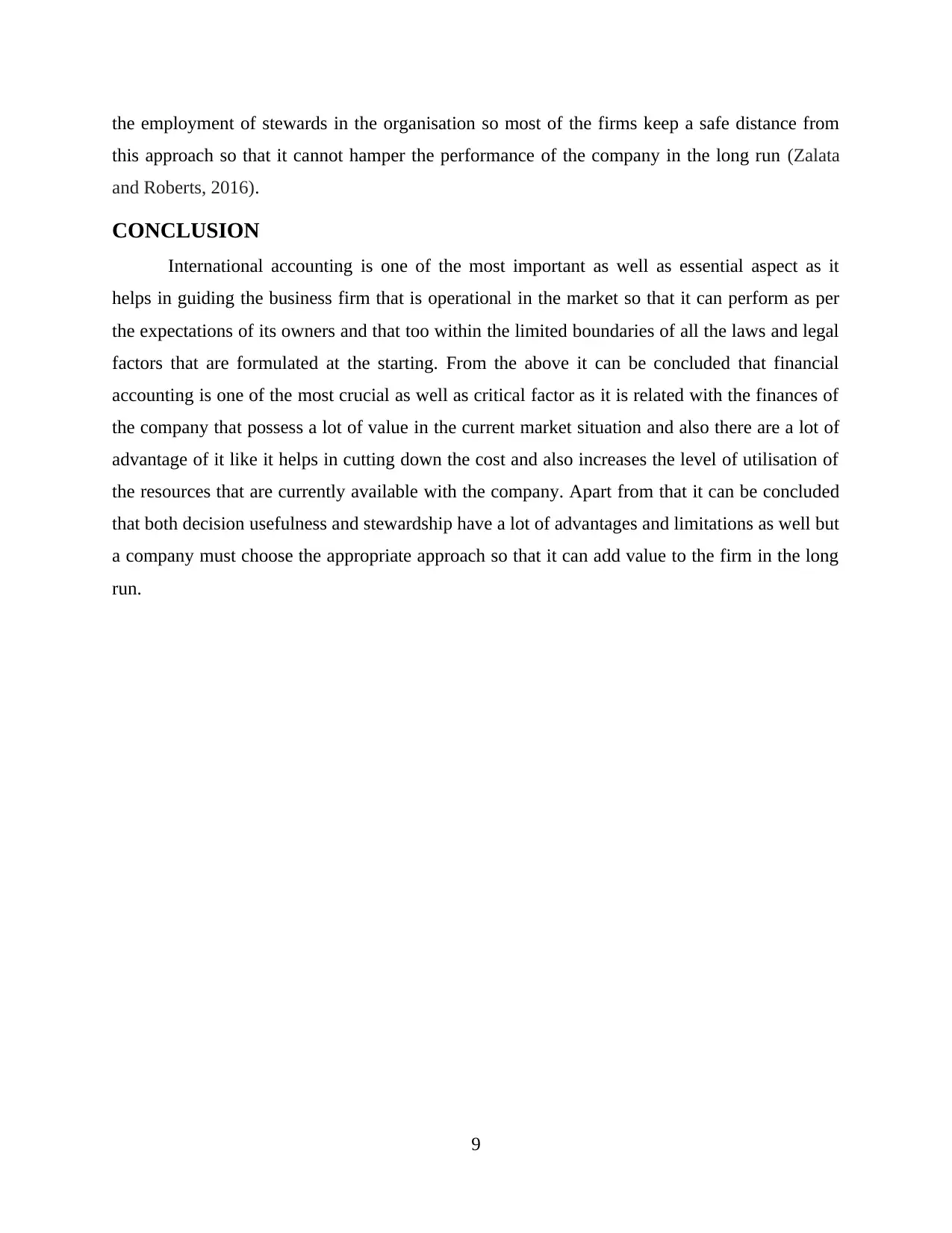
the employment of stewards in the organisation so most of the firms keep a safe distance from
this approach so that it cannot hamper the performance of the company in the long run (Zalata
and Roberts, 2016).
CONCLUSION
International accounting is one of the most important as well as essential aspect as it
helps in guiding the business firm that is operational in the market so that it can perform as per
the expectations of its owners and that too within the limited boundaries of all the laws and legal
factors that are formulated at the starting. From the above it can be concluded that financial
accounting is one of the most crucial as well as critical factor as it is related with the finances of
the company that possess a lot of value in the current market situation and also there are a lot of
advantage of it like it helps in cutting down the cost and also increases the level of utilisation of
the resources that are currently available with the company. Apart from that it can be concluded
that both decision usefulness and stewardship have a lot of advantages and limitations as well but
a company must choose the appropriate approach so that it can add value to the firm in the long
run.
9
this approach so that it cannot hamper the performance of the company in the long run (Zalata
and Roberts, 2016).
CONCLUSION
International accounting is one of the most important as well as essential aspect as it
helps in guiding the business firm that is operational in the market so that it can perform as per
the expectations of its owners and that too within the limited boundaries of all the laws and legal
factors that are formulated at the starting. From the above it can be concluded that financial
accounting is one of the most crucial as well as critical factor as it is related with the finances of
the company that possess a lot of value in the current market situation and also there are a lot of
advantage of it like it helps in cutting down the cost and also increases the level of utilisation of
the resources that are currently available with the company. Apart from that it can be concluded
that both decision usefulness and stewardship have a lot of advantages and limitations as well but
a company must choose the appropriate approach so that it can add value to the firm in the long
run.
9
⊘ This is a preview!⊘
Do you want full access?
Subscribe today to unlock all pages.

Trusted by 1+ million students worldwide
1 out of 15
Related Documents
Your All-in-One AI-Powered Toolkit for Academic Success.
+13062052269
info@desklib.com
Available 24*7 on WhatsApp / Email
![[object Object]](/_next/static/media/star-bottom.7253800d.svg)
Unlock your academic potential
Copyright © 2020–2026 A2Z Services. All Rights Reserved. Developed and managed by ZUCOL.




